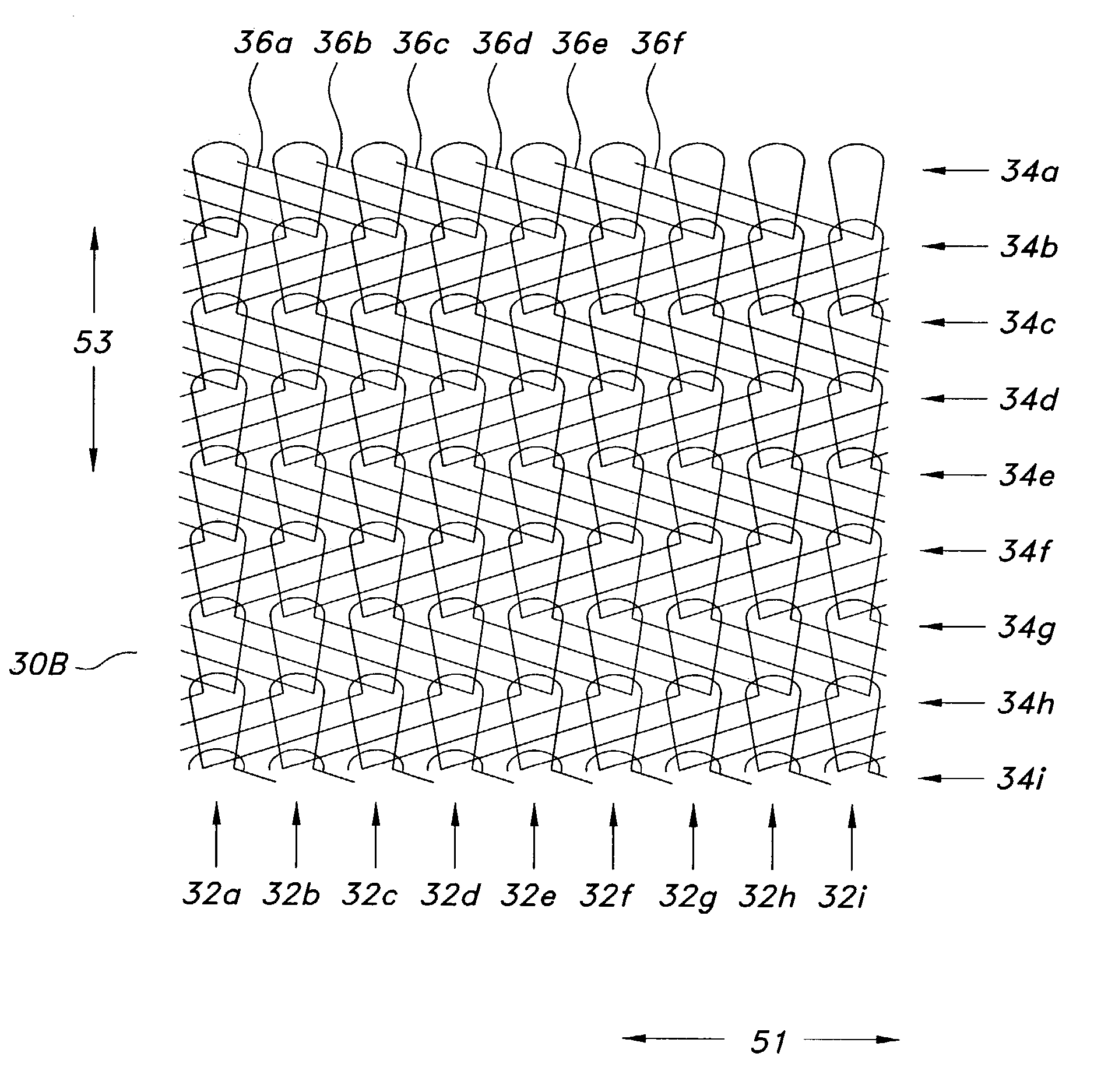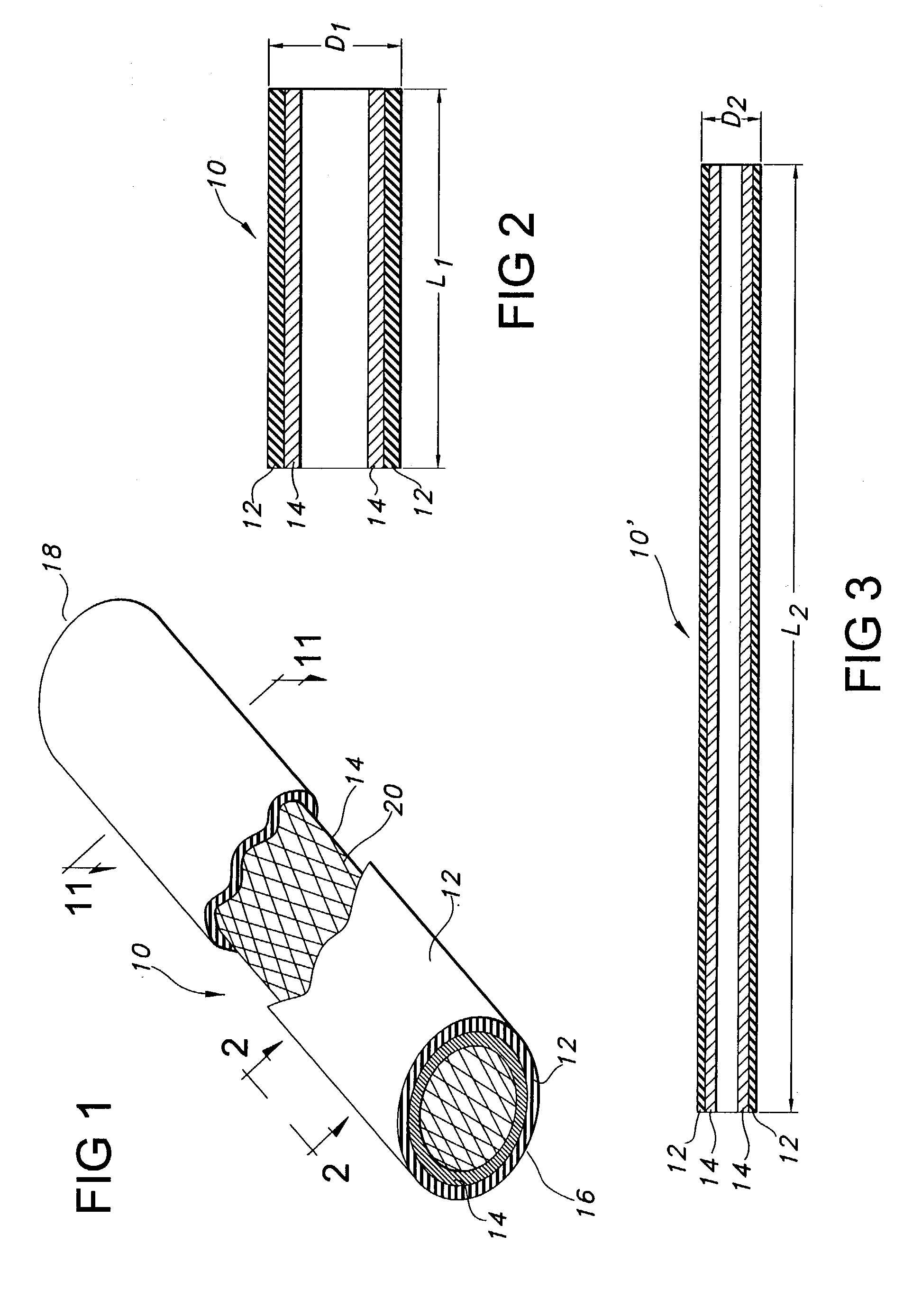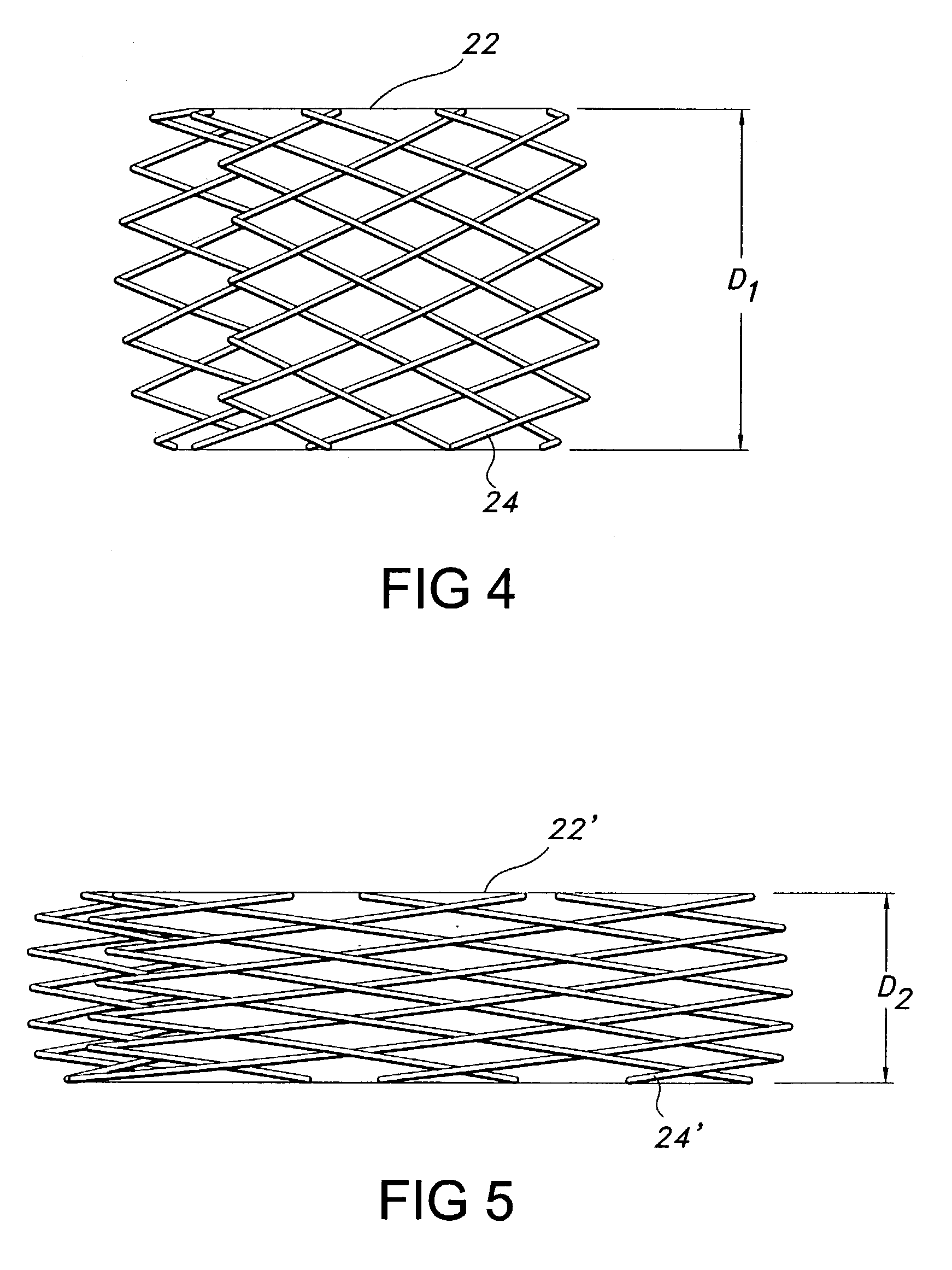Low profile, high stretch, low dilation knit prosthetic device
a prosthetic device and low profile technology, applied in the field of intraluminal prosthesis, can solve the problems of dilatation of intraluminal devices, complicated implantation of stent-grafts, and complicated placement of stent-grafts on stents and stent-grafts,
- Summary
- Abstract
- Description
- Claims
- Application Information
AI Technical Summary
Benefits of technology
Problems solved by technology
Method used
Image
Examples
example 1
Single Layer Stretch Knit Bifurcated Tubular Graft With a Two-Needle Underlap With Straight Tube (Body or Leg) knitting Details
[0100] The following specifications are used to fabricate a solid knitted prosthesis of the present invention.
[0101] Yarn Type: Texturized polyethylene terephthalate (PET), 40 denier, 27 filaments.
[0102] Machine Type: 60 Gauge Karl Mayer Machine (30 needles per inch).
[0103] Number of Guide Bars: Sixteen
[0104] Guide bars 1-8, if threaded, were used for knitting the front of the graft and guide bars 9-16, if threaded, were used for the rear of the graft.
6 16 Guide Bar Layout: 1 2 3 4 5 6 7 8 9 10 11 12 13 14 15 16 G G 3-C-4 5-C-6 7-C-8 9-C-10 11-C-12 13-C-14 G G Notes: G: Ground Bars C: Nested Connect Bars
[0105] Guide Bar Threading Details: (Y--Threaded / n--Not Threaded)
7 72 Needle Bifurcated (BIF) Tube or Body Bar No. Note: .rarw. (One Repeat Unit) .fwdarw. #16 not used n N n n n n n N n n n n #15 n Y Y Y Y n n Y Y Y Y n #14 R Y n N n n n n n N n n n Y #13 CL ...
example 2
Single Layer Knit Tubular Graft With a Three Needle Underlap
[0113] The following specifications are used to fabricate a solid knitted prosthesis of the present invention.
[0114] Yarn Type: Texturized polyethylene terephthalate (PET), 40 denier, 27 filaments.
[0115] Machine Type: 56 Gauge Kiddie Machine (28 needles per inch).
[0116] Number of Guide Bars: Eight
[0117] Guide Bar Threading Details: (y--Threaded / n--Not Threaded)
[0118] Guide Bar No. 8: y / y / y / y / y / y / y / y / n / n / n
[0119] Guide Bar No. 7: y / n / n / n / n / n / n / n / n / n / n
[0120] Guide Bar No. 6: n / n / n / n / n / n / n / n / n / n / y
[0121] Guide Bar No. 5: y / n / n / n / n / n / n / n / n / n / n
[0122] Guide Bar No. 4: n / n / n / n / n / n / n / n / n / y / n
[0123] Guide Bar No. 3: y / n / n / n / n / n / n / n / n / n / n
[0124] Guide Bar No. 2: y / n / n / n / n / n / n / n / n / n / n
[0125] Guide Bar No. 1: y / y / y / y / y / y / y / y / n / n / n
[0126] Guide Bar Position Details:
[0127] Guide Bar No. 1: 6-8-4-4 / 2-0-4-4 / (repeat) Front Full Thread
[0128] Guide Bar No. 8: 4-4-2-0 / 4-4-6-8 / (repeat) Back Full Thread
[0129] Guide Bar No. 2: 4-6-2-2 / 0-0-0-2 / (repeat) ...
example 3
Single Layer Stretch Knit Straight Tubular Graft with a Two-Needle Underlap
[0139] The following specifications were used to fabricate a super stretch knitted prosthesis of the present invention.
[0140] Yarn Type Used: Texturized polyethylene terephthalate (PET), 40 denier, 27 filaments.
[0141] Machine Used: 56 Gauge Kiddie Machine (28 needles per inch)
[0142] Guide Bars Used: 6
11 Guide Bar Threading Details: (y--threaded, n--not threaded): Guide Bar n n y y y Y y y y y y n No. 6 Guide Bar n y n n n N n n n n n n No. 5 Guide Bar n n n n n N n n n n n y No. 4 Guide Bar n n n n n N n n n n y n No. 3 Guide Bar y n n n n N n n n n n n No. 2 Guide Bar n n y y y Y y y y y y n No. 1
[0143]
12 Guide Bar Chain Notation Details: Guide Bar No. 1: 2-0 / 4-4 / 4-6 / 2-2 / / repeat Front full thread Guide Bar No. 2: 4-2 / 4-4 / 2-2 / 2-0 / / repeat Left connector Guide Bar No. 3: 2-2 / 2-4 / 0-2 / 0-0 / / repeat Right connector Guide Bar No. 4: 0-0 / 0-2 / 2-4 / 2-2 / / repeat Right connector Guide Bar No. 5: 2-0 / 2-2 / 4-4 / 4-2 / / repeat...
PUM
| Property | Measurement | Unit |
|---|---|---|
| thickness | aaaaa | aaaaa |
| thickness | aaaaa | aaaaa |
| thickness | aaaaa | aaaaa |
Abstract
Description
Claims
Application Information
 Login to View More
Login to View More - R&D
- Intellectual Property
- Life Sciences
- Materials
- Tech Scout
- Unparalleled Data Quality
- Higher Quality Content
- 60% Fewer Hallucinations
Browse by: Latest US Patents, China's latest patents, Technical Efficacy Thesaurus, Application Domain, Technology Topic, Popular Technical Reports.
© 2025 PatSnap. All rights reserved.Legal|Privacy policy|Modern Slavery Act Transparency Statement|Sitemap|About US| Contact US: help@patsnap.com



